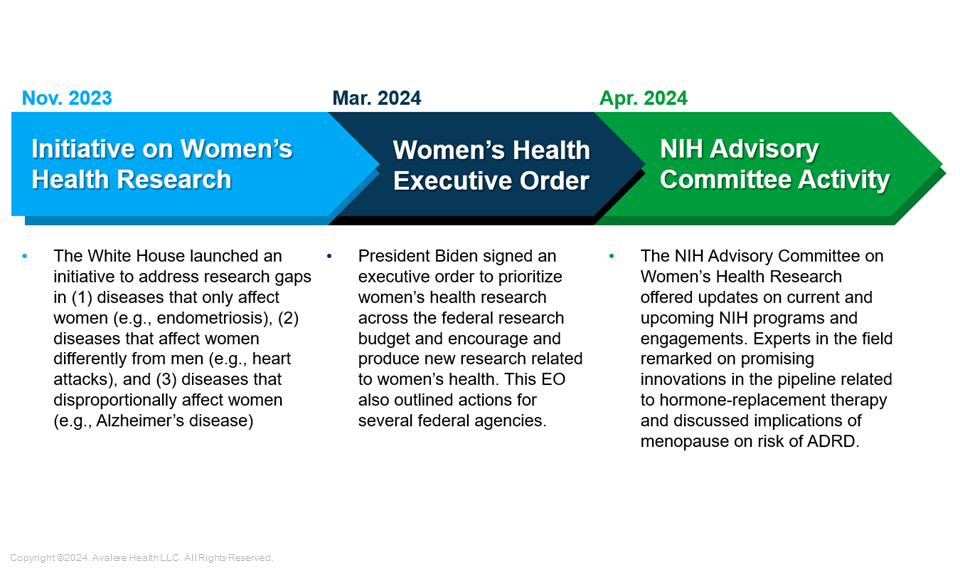Addressing Sex and Gender Disparities in Cognitive Health
Summary
Women are more likely to experience reduced cognitive health later in life. Recent federal efforts seek to address the paucity of research on this phenomenon.Background
Cognitive health is defined as the ability to clearly think, learn, and remember, and is distinct from mental health, which focuses on psychological and emotional functions associated with the brain.
Aging causes cognitive decline, but some adults experience a more pronounced decline in executive functions and memory than expected for their age. This decline, influenced by hereditary and lifestyle factors, can lead to conditions like Alzheimer’s disease and related dementias (ADRD), which progressively impair daily activities. While age is the primary risk factor, sex- and gender-specific factors also contribute to cognitive health decline.
Sex Differences in Cognitive Decline
Research shows that women decline faster in global cognition and executive function than men. During perimenopause and menopause, women often experience “brain fog” due to a sharp decline in estrogen, which has a neuroprotective role. Post-menopause, lower estrogen levels are linked to higher cardiovascular disease risk, making women more susceptible to vascular dementias than men of the same age.
Women experiencing cognitive decline tend to outperform men on verbal memory examinations testing cognitive decline, indicating additional cognitive reserve in women over men. This can delay clinical intervention in women, leading to more advanced disease at diagnosis and affecting outcomes.
Women comprise two-thirds of Alzheimer’s disease (AD) cases and have twice the risk of developing it compared to men. This disparity is partly due to genetic and biological factors, such as a higher likelihood of carrying the APOE4 mutation, a major genetic risk factor for early-onset AD. Additional studies are needed to understand why we see sex and gender differences in AD risk, burden, and progression, and to advance women-focused care and treatment.
Economic Impact of Women-Focused ADRD Research
Women have long been understudied and underrepresented in research and clinical trials, with the lack of funding even more pronounced in conditions that affect women exclusively (e.g., menopause) or disproportionately (e.g., ADRD). Despite the high burden of ADRD on women, 12% ($287.8 million) of the National Institutes of Health’s (NIH) 2019 budget for AD went to women-focused research.
The total cost of AD to families, businesses, and the government is estimated to exceed $300 billion per year. Part of this cost comes from the overwhelming and often unpaid caregiver burden for ADRD. Moreover, women make up 60% of caregivers for people with AD.
A 2021 report found that doubling NIH funding for women-focused ADRD research would yield $930 million in economic returns through reduced nursing home care and fewer years lived with ADRD, highlighting the benefits of investing in women’s ADRD research.
Recent Initiatives and Ongoing Research
There are several ongoing initiatives designed to address gaps in women’s health over the next several years, with ADRD as an area of interest.
Federal Women’s Health Initiatives

The executive order allocates $200 million to the NIH for women’s health research and $100 million to the Advanced Research Projects Agency for Health (ARPA-H) for innovative research projects that may otherwise not be granted due to their high-risk nature. One topic of interest for ARPA-H is “Advancing Women’s Brain Health Via Lymphatic Targeting,” which prioritizes research on the influence of sex differences in the lymphatic system on brain health in women to inform the prevention, early diagnosis, and treatment of neurodegenerative diseases.
In addition to enacting the executive order, the Biden administration has urged federal legislators to create and invest $12 billion in a central fund for women’s health to galvanize research. The national focus on women’s health and increased research is important for stakeholders to consider in developing their own priorities and research direction.
Work With Us
Avalere is uniquely positioned to assist stakeholders in understanding the patient journey of women facing cognitive health issues and can leverage a bench of experts in regulatory strategy, evidence strategy, and patient access to focus on clinical trial design, new innovations, and access considerations in this space. Avalere can assist clients with primary research to better understand the gaps and barriers women face in diagnosing and treating conditions related to cognitive decline. To learn more about how Avalere can assist you, connect with us.
January 23, 11 AM ET
Learn More



